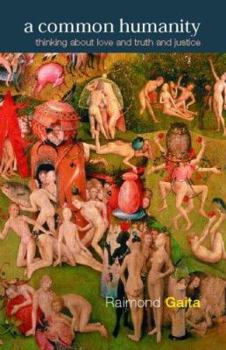A Common Humanity: Thinking about Love and Truth and Justice
Select Format
Select Condition 
Book Overview
The Holocaust and attempts to deny it, racism, murder, the case of Mary Bell. How can we include these and countless other examples of evil within our vision of a common humanity? These painful human incongruities are precisely what Raimond Gaita boldly harmonizes in his powerful new book, A Common Humanity.
Hatred with forgiveness, evil with love, suffering with compassion, and the mundane with the precious. Gaita asserts that our conception of humanity cannot be based upon the empty language of individual rights when it is our shared feelings of grief, hope, love, guilt, shame and remorse that offer a more potent foundation for common understanding. Drawing on the work of Hannah Arendt, Simon Weil, Primo Levi, George Orwell, Iris Murdoch and Sigmund Freud, Gaita creates a beautifully written and provocative new picture of our common humanity.
Hatred with forgiveness, evil with love, suffering with compassion, and the mundane with the precious. Gaita asserts that our conception of humanity cannot be based upon the empty language of individual rights when it is our shared feelings of grief, hope, love, guilt, shame and remorse that offer a more potent foundation for common understanding. Drawing on the work of Hannah Arendt, Simon Weil, Primo Levi, George Orwell, Iris Murdoch and Sigmund Freud, Gaita creates a beautifully written and provocative new picture of our common humanity.
Format:Paperback
Language:English
ISBN:0415241146
ISBN13:9780415241144
Release Date:January 2002
Publisher:Routledge
Length:336 Pages
Weight:0.80 lbs.
Dimensions:0.9" x 5.2" x 7.7"
Customer Reviews
2 ratings
An Essan on the Language of Morality
Published by Thriftbooks.com User , 16 years ago
From Back Cover: "'A Common Humanity: Thinking about Love and Truth and Justice' is a powerful and timely book about why much of the language of morality has failed us. Drawing on the examples of the Holocaust, the David Irving affair, the case of Mary Bell and the treatment of the Aborigines in Australia, [this book] is essential reading for anyone interested in what makes an ethical society. Raimond Gaita is Professor of Moral Philosophy at King's College London and Professor of Philosophy at the Australian Catholic University. He is author of the prize-winning biography of his father, 'Romulus, My Father.'"
thoughtful and compassionate
Published by Thriftbooks.com User , 23 years ago
I read this book on basis of positive book reviews and I can only agree with those recommendations. Prof. Gaita as a professional philosopher deals with profound yet everyday occurrences and issues of human life, as the title also suggests: 'thinking about love and truth and justice'. This book deals with morality, concepts of good and evil and what occurs in human lives with intelligence, subtlety and compassion. He discusses, inter alia, the Holocaust, racism, and Australian Aboriginals. He points out that other people are treated as sub-humans only when there is a denial of the common humanity with the other. And these are issues on what occurs in human lives that every generation has to face and think about anew. I particularly liked his explanation of our relation to other, the notion that our sense of reality of others is partly conditioned by our vulnerability to them, the realisation of what it means to wrong them. Remorse is that realisation, and it is interdependent with a definite (and innate?) concept of evil. Grief, when it is not self-indulgent, is a heightened form of the awareness of another, a pained realisation of the independent reality of those we have lost. According to Gaita, it is astonishing that there could be such a state as guilt and suffering as remorse, with as a counterpart the wonder that other human beings could matter so much to us. It is challenging, moving, and certainly not an easy book to read, and i do not pretend I always fully could follow the reasoning. But then, i did not expect it to be easy. In fact, I would have been suspicious if that would have been the case. The approach is different from e.g. the American philosopher R. Rorty and i found it as enlightening. Recommended!






